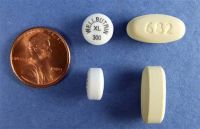Generic Wellbutrin not as effective?
 |
MSNBC reports on a recent independent study by a group called ConsumerLab that compared Wellbutrin with its generic alternative, after a range of complaints emerged that the generic wasn't as effective as the real thing.
For the testing, ConsumerLab.com purchased both the original Wellbutrin XL 300 mg sold by GlaxoSmithKline and the generic version sold by Teva, the same one that Douglas took and that many other readers complained about, and had six samples of each drug analyzed. While both drugs contained the stated amount of the active ingredient, bupropion, "dissolution testing" showed that the generic drug, which has a different time-release mechanism, released the active ingredient into a solution at a quicker rate.
"The Teva product released nearly half of its ingredients in the first four hours," says Cooperman. "The original Wellbutrin released 25 percent."
Within the first two hours, 8 percent of the original Wellbutrin had dissolved, compared with 34 percent of the Teva product, according to Cooperman. By 16 hours, both drugs had released all the medicine.
If the active ingredient is released more quickly into a patient's bloodstream, that could mean there is less medication available to the patient later, which may explain why people like Douglas experienced a return of their depression, Cooperman says. It also may explain why some readers who wrote in complained of more side effects, such as headache, irritability and nausea, given they may have received a higher dosage of the medicine upfront, he says. "Too much Wellbutrin can cause side effects, even the potential for seizure," he says.
How could this sort of thing happen? The FDA doesn't require generics to be tested quite as rigorously as the original versions:
The FDA does not require generic drugmakers seeking approval to do clinical trials of their drugs on hundreds or thousands of people as is required for brand drugs. Instead, the agency requires lab data and "bioequivalence" testing in about 24 to 36 healthy volunteers showing that the drug appears in the bloodstream in a similar manner to the brand, says Walsh.
The article goes on to speculate that this kind of discrepancy could theoretically pop up amongst anti-seizure meds or any of a range of other classes of drugs. Naturally generic manufacturers have the shield of "hey, we're FDA approved!" to stand behind in their defense, while the FDA has the shield of... uh... making the rules in the first place I guess, so it's not all cut and dried here. But the findings do "raise questions... on the reliability of FDA testing for these types of drugs." At least "these types of drugs" are cheap!
|

Recently @ DoseNation
|
|





















